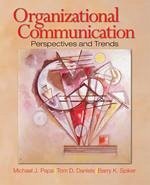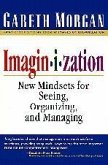- Gebundenes Buch
- Merkliste
- Auf die Merkliste
- Bewerten Bewerten
- Teilen
- Produkt teilen
- Produkterinnerung
- Produkterinnerung
The Fifth Edition of this best-selling introductory organizational communication textbook continues to examine and explore the problems and paradoxes of organizational communication and the changing features of organizational life that have been revealed through the application of pluralistic perspectives. The implications of race, gender, technology, and increasing globalization to organizational communication all receive expanded treatment.
Andere Kunden interessierten sich auch für
![Management Management]() Christopher P NeckManagement182,99 €
Christopher P NeckManagement182,99 €![Management Fundamentals Management Fundamentals]() Robert N LussierManagement Fundamentals182,99 €
Robert N LussierManagement Fundamentals182,99 €![Managing Business Ethics Managing Business Ethics]() Mel FugateManaging Business Ethics137,99 €
Mel FugateManaging Business Ethics137,99 €![Management Today Management Today]() Terri A ScanduraManagement Today182,99 €
Terri A ScanduraManagement Today182,99 €![Managing Business Ethics Managing Business Ethics]() Mel FugateManaging Business Ethics117,99 €
Mel FugateManaging Business Ethics117,99 €![Small Business Management Small Business Management]() Timothy S HattenSmall Business Management183,99 €
Timothy S HattenSmall Business Management183,99 €![Imaginization Imaginization]() Gareth MorganImaginization198,99 €
Gareth MorganImaginization198,99 €-
-
-
The Fifth Edition of this best-selling introductory organizational communication textbook continues to examine and explore the problems and paradoxes of organizational communication and the changing features of organizational life that have been revealed through the application of pluralistic perspectives. The implications of race, gender, technology, and increasing globalization to organizational communication all receive expanded treatment.
Hinweis: Dieser Artikel kann nur an eine deutsche Lieferadresse ausgeliefert werden.
Hinweis: Dieser Artikel kann nur an eine deutsche Lieferadresse ausgeliefert werden.
Produktdetails
- Produktdetails
- Verlag: Sage Publications
- Seitenzahl: 472
- Erscheinungstermin: 1. November 2007
- Englisch
- Abmessung: 241mm x 195mm x 25mm
- Gewicht: 859g
- ISBN-13: 9781412916844
- ISBN-10: 1412916844
- Artikelnr.: 22970906
- Herstellerkennzeichnung
- Libri GmbH
- Europaallee 1
- 36244 Bad Hersfeld
- gpsr@libri.de
- Verlag: Sage Publications
- Seitenzahl: 472
- Erscheinungstermin: 1. November 2007
- Englisch
- Abmessung: 241mm x 195mm x 25mm
- Gewicht: 859g
- ISBN-13: 9781412916844
- ISBN-10: 1412916844
- Artikelnr.: 22970906
- Herstellerkennzeichnung
- Libri GmbH
- Europaallee 1
- 36244 Bad Hersfeld
- gpsr@libri.de
Michael J. Papa (Ph.D., Temple University; M.A., Central Michigan University; B.A., St. John's University) teaches courses in organizational communication, research methods, and innovation diffusion. Papa has been involved in the design, evaluation, and documentation of various organizations for social change initiatives in Bangladesh, India, Thailand, and the U.S. In addition to this work, he has also conducted research in conflict management, group decision-making processes, management selection and development, and technology diffusion in organizations. Most recently, he has served as a consultant to The Carter Center in Atlanta, GA, documenting President Carter¿s approach to negotiating peace with a focus on the settlement reached between Uganda and Sudan. Papa has received ten research awards for top papers from The National Communication Association and The International Communication Association.
Preface Prologue 1. An Orientation to Organizational Communication Organization and Communication Perspectives on Organizational Communication 2. Communication and Its Functions A Precaution: Function and Structure Relationship Communication, Information, and Meaning Functions of Communication 3. Organizational Communication Structure Traditional Approach to Structure Formal Communication Informal Communication Communication Structure as a Network Interpretive Approaches to Communication Structure Critical Approaches to Communication Structure 4. Organization Theory: Prescriptions for Control Scientific and Classical Management Transitional Theories The Human Relations Movement Human Resource Development 5. Organization Theory: Metaphors of Biology System Theory Weick
s Theory of Organizing Luhmann
s Social Systems Theory Evolutionary Psychology 6. Organizational Theory: Communication and Culture Communication and Culture: A Way to Understand Organizations Approaches to Understanding Organizational Culture Describing Organizational Culture: The Case of Ben & Jerry
s 7. Information Technology Information Technology and Change Traditional Perspective Interpretive Perspective Critical Perspective 8. Cultural Control, Diversity, and Change Cultural Control Organizational Culture and Diversity Traditional Perspectives on Cultural Control, Diversity, and Change Interpretive Perspectives on Cultural Control, Diversity, and Change Critical Perspectives on Cultural Control, Diversity, and Change The Ethics of Diversity 9. Group Relationships Traditional Perspective on Group Relationships Interpretive Perspective on Group Relationships Critical Perspective on Group Relationships 10. Leader-Member Relationships Limitations of Leadership Theory and Research Traditional Perspective Interpretive Perspective Critical Perspective 11. Power Traditional Views of Status and Power Interpretive Perspectives on Power Power in the View of Critical Theory Power and Conflict: Connected and Separate Phenomena 12. Conflict Traditional Perspectives on Conflict Interpretive Perspectives on Conflict Critical Perspectives on Conflict Ethics in Conflict 13. Strategic Communication Characteristics of Strategic Communication The Traditional Perspective The Interpretive Perspective The Critical Perspective 14. New Millennium Thought: Perspectives and Trends Perspectives on the New Millennium Traditional Perspectives and the New Millennium Interpretive Perspectives and the New Millennium Critical Perspectives and the New Millennium Trends Influencing Organizations Today
s Theory of Organizing Luhmann
s Social Systems Theory Evolutionary Psychology 6. Organizational Theory: Communication and Culture Communication and Culture: A Way to Understand Organizations Approaches to Understanding Organizational Culture Describing Organizational Culture: The Case of Ben & Jerry
s 7. Information Technology Information Technology and Change Traditional Perspective Interpretive Perspective Critical Perspective 8. Cultural Control, Diversity, and Change Cultural Control Organizational Culture and Diversity Traditional Perspectives on Cultural Control, Diversity, and Change Interpretive Perspectives on Cultural Control, Diversity, and Change Critical Perspectives on Cultural Control, Diversity, and Change The Ethics of Diversity 9. Group Relationships Traditional Perspective on Group Relationships Interpretive Perspective on Group Relationships Critical Perspective on Group Relationships 10. Leader-Member Relationships Limitations of Leadership Theory and Research Traditional Perspective Interpretive Perspective Critical Perspective 11. Power Traditional Views of Status and Power Interpretive Perspectives on Power Power in the View of Critical Theory Power and Conflict: Connected and Separate Phenomena 12. Conflict Traditional Perspectives on Conflict Interpretive Perspectives on Conflict Critical Perspectives on Conflict Ethics in Conflict 13. Strategic Communication Characteristics of Strategic Communication The Traditional Perspective The Interpretive Perspective The Critical Perspective 14. New Millennium Thought: Perspectives and Trends Perspectives on the New Millennium Traditional Perspectives and the New Millennium Interpretive Perspectives and the New Millennium Critical Perspectives and the New Millennium Trends Influencing Organizations Today
Preface Prologue 1. An Orientation to Organizational Communication Organization and Communication Perspectives on Organizational Communication 2. Communication and Its Functions A Precaution: Function and Structure Relationship Communication, Information, and Meaning Functions of Communication 3. Organizational Communication Structure Traditional Approach to Structure Formal Communication Informal Communication Communication Structure as a Network Interpretive Approaches to Communication Structure Critical Approaches to Communication Structure 4. Organization Theory: Prescriptions for Control Scientific and Classical Management Transitional Theories The Human Relations Movement Human Resource Development 5. Organization Theory: Metaphors of Biology System Theory Weick
s Theory of Organizing Luhmann
s Social Systems Theory Evolutionary Psychology 6. Organizational Theory: Communication and Culture Communication and Culture: A Way to Understand Organizations Approaches to Understanding Organizational Culture Describing Organizational Culture: The Case of Ben & Jerry
s 7. Information Technology Information Technology and Change Traditional Perspective Interpretive Perspective Critical Perspective 8. Cultural Control, Diversity, and Change Cultural Control Organizational Culture and Diversity Traditional Perspectives on Cultural Control, Diversity, and Change Interpretive Perspectives on Cultural Control, Diversity, and Change Critical Perspectives on Cultural Control, Diversity, and Change The Ethics of Diversity 9. Group Relationships Traditional Perspective on Group Relationships Interpretive Perspective on Group Relationships Critical Perspective on Group Relationships 10. Leader-Member Relationships Limitations of Leadership Theory and Research Traditional Perspective Interpretive Perspective Critical Perspective 11. Power Traditional Views of Status and Power Interpretive Perspectives on Power Power in the View of Critical Theory Power and Conflict: Connected and Separate Phenomena 12. Conflict Traditional Perspectives on Conflict Interpretive Perspectives on Conflict Critical Perspectives on Conflict Ethics in Conflict 13. Strategic Communication Characteristics of Strategic Communication The Traditional Perspective The Interpretive Perspective The Critical Perspective 14. New Millennium Thought: Perspectives and Trends Perspectives on the New Millennium Traditional Perspectives and the New Millennium Interpretive Perspectives and the New Millennium Critical Perspectives and the New Millennium Trends Influencing Organizations Today
s Theory of Organizing Luhmann
s Social Systems Theory Evolutionary Psychology 6. Organizational Theory: Communication and Culture Communication and Culture: A Way to Understand Organizations Approaches to Understanding Organizational Culture Describing Organizational Culture: The Case of Ben & Jerry
s 7. Information Technology Information Technology and Change Traditional Perspective Interpretive Perspective Critical Perspective 8. Cultural Control, Diversity, and Change Cultural Control Organizational Culture and Diversity Traditional Perspectives on Cultural Control, Diversity, and Change Interpretive Perspectives on Cultural Control, Diversity, and Change Critical Perspectives on Cultural Control, Diversity, and Change The Ethics of Diversity 9. Group Relationships Traditional Perspective on Group Relationships Interpretive Perspective on Group Relationships Critical Perspective on Group Relationships 10. Leader-Member Relationships Limitations of Leadership Theory and Research Traditional Perspective Interpretive Perspective Critical Perspective 11. Power Traditional Views of Status and Power Interpretive Perspectives on Power Power in the View of Critical Theory Power and Conflict: Connected and Separate Phenomena 12. Conflict Traditional Perspectives on Conflict Interpretive Perspectives on Conflict Critical Perspectives on Conflict Ethics in Conflict 13. Strategic Communication Characteristics of Strategic Communication The Traditional Perspective The Interpretive Perspective The Critical Perspective 14. New Millennium Thought: Perspectives and Trends Perspectives on the New Millennium Traditional Perspectives and the New Millennium Interpretive Perspectives and the New Millennium Critical Perspectives and the New Millennium Trends Influencing Organizations Today








